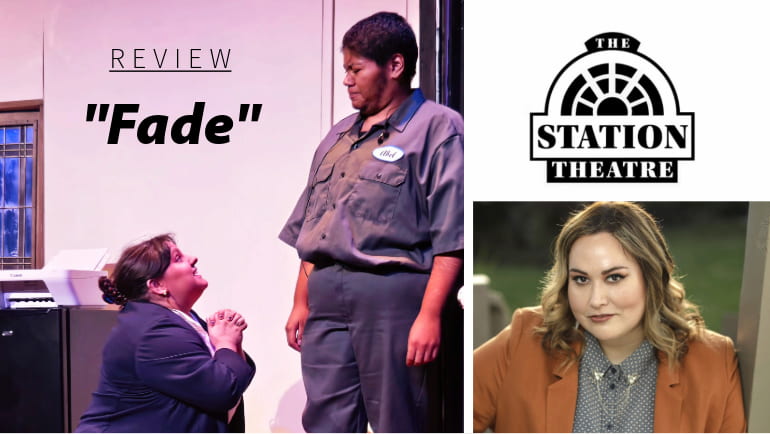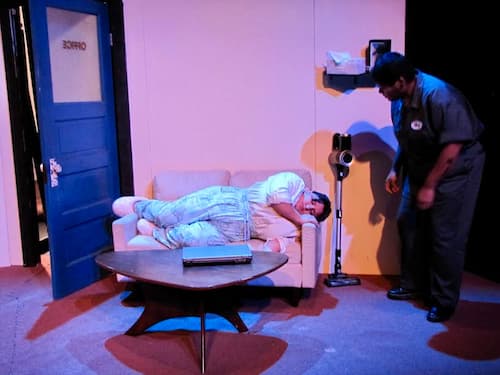URBANA — Few things are safer or more comforting than community and personal connection, especially if you’re part of a marginalized identity.
A shared struggle can help us overcome differences we’d otherwise have. But sometimes, people in our own communities choose personal success over that connection — and hurt others along the way.
That’s the cautionary message of Station Theatre’s new dramatic comedy Fade by Tanya Saracho, directed by Jacqueline Moreno. You can see it tomorrow through Sunday.

Above, left to right: a key scene between TV writer Lucia and custodian Abel, the Station Theatre, logo, and Fade playwright Tanya Saracho.
Lucia is a plucky Mexican novelist who’s been hired by a TV studio and feels stuck in a white male-dominated workplace away from her home country. She questions if her boss even knows whether she is a writer or his assistant hired to fetch coffee and talk to his housekeeper.
Seeking a friend in an unfriendly place, she latches onto Abel, a quiet Mexican-American working-class custodian in the same building. The two assume a lot about each other: Abel calls Lucia a “fresa,” a Mexican slang term for a superficial young wealthy person, while she assumes he should speak Spanish at work because he “looks Mexican.”
The first scenes of her trying to befriend him are cringey in a sympathetic way; at one point she pleads on her knees for Abel to talk more to her.
Lucia (played by Li Reichlin) helps Abel (portrayed by Anissa Reinoso) open up. He helps her keep hold of her identity and stand up to the older white men around her. They bond despite their differences, even trading gifts when they upset each other.
Lucia finds more confidence, a voice and success at work. Abel thinks he has found a genuine friend with whom he can connect and share things he can’t tell other people.
Touching tale evolves into trading ‘friendship for ambition’
The friendship and play seem at first to be about dismantling prejudices. But as the play proceeds, Saracho comments on class and the corporate environment. She suggests they can erase identities — make them fade, perhaps? — in the “hustle” and search for success and approval. She suggests the hustle can cause us to forget our roots and connections.
Lucia is originally insecure, bubbly and isolated, but becomes more driven and forceful. Throughout the play, you’re left wondering if she is cunning and ambitious, or stumbling in an unfamiliar environment. For example, she gets a racist coworker fired — then takes his post.
She begins putting details of Abel’s life into her scripts and makes less time for Abel. Her shift is subtle at first, but hits you in the face in the end, when you realize she has exploited Abel and his stories and traded friendship for ambition.
The play’s complex look at class, race, sexism and work culture is why Fade is so relevant. The characters’ struggles are also familiar to marginalized people. It suggests class differences are hard to overcome. And it asks how, in a polarized society, we can overcome gaps between us.
Fade is not a quick play. From the fade to black after every scene, to Abel vacuuming to pass more time, the play can take a slow pace. This helps immersion, but also feels like padding and leaves you wanting some conversations to be longer or more developed.
Because of the small cast, we get to know both main characters pretty well. Lucia and Abel are well-developed because there are no other people to focus on. When Lucia flopped or succeeded or felt anxious, I felt it, because we spent plenty of time with her.

Custodian Abel is portrayed by nonbinary Anissa Reinoso in The Station Theatre’s production of “Fade,” happening through Sunday. Lucia is portrayed by Li Reichlin.
Also, Station Theatre’s move to cast nonbinary Reinoso as Abel is unique compared to other productions, almost all of which appear to cast a cisgender male in the role.
Saracho, a writer for HBO’s Girls and ABC’s How to Get Away with Murder, also pulls on her own life for the play. She herself is Mexican-born, although from Chicago, not Los Angeles. During her work with a TV studio, she was told she was a diversity hire by a white coworker. She befriended a custodian.
She told San Diego Magazine in 2018 she hopes the play, which premiered in Denver in 2016, and on Off-Broadway in 2017, shows “the complexity of what it’s like to be Mexican right now. How we have to navigate and code switch in a way that maybe your average American doesn’t have to.”
I strongly recommend Fade. Set assumptions aside, and watch two characters build an unlikely friendship through shared struggles, then lose that connection. We can all learn from their saga.
Fade shows at 7 p.m. every night from Oct. 30 to Nov. 2 at the Station Theatre, which also provides above-stage captions for the deaf and hearing-impaired. Tickets are $17 or $14 for students and seniors 65 and older; get yours here.
(Photos courtesy Station Theatre)

